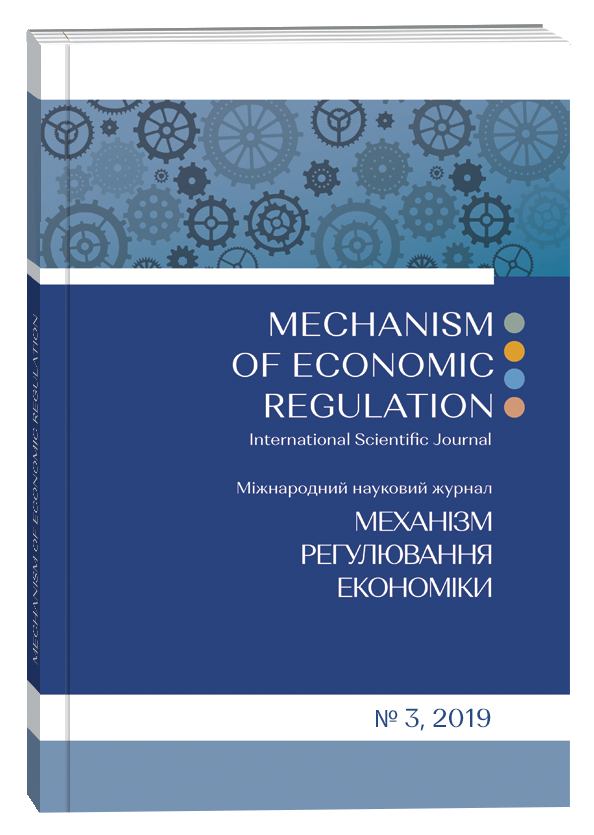MANAGEMENT OF DIGITAL INFORMATION TECHNOLOGIES IN DIGITAL ECONOMY
Abstract
The problem of managing digital information technologies in the context of intensified transformation of the economy into a digital one is considered in the article. The tasks of “digitization” of the economy, business environment, socio-cultural relations in modern society are extremely urgent and complex. By and large, Ukraine is just starting to move in that direction. Given the importance and complexity of the tasks, both tactical and strategic, unfolding before economic agents in the study the definitions of “digital economy” and “digital information technology” are offered. The definition of “management of digital information technologies” and the main components of this process are offered. The state of integration of digital technologies in the business processes of enterprises in the European Union countries with the most advanced digital economy is analysed within the study. It was found that digital technologies are sufficiently used in every country, while most people have basic or higher than basic digital skills when conducting research. It has been determined that the main driver for business digitization and integration of digital information technologies into business processes is management staff with relevant competencies, experience, knowledge, skills. Staff (staff, contractors, stakeholders) must have competitive digital skills and skills to manage digital information technology, integrate them into business processes, practical, scientific and engineering consultancy, in particular to develop companies' digital strategies, recruitment and information and communication technology staffing he has tasks to digitize his business. A sufficiently high level of digitalization and integration of digital information technology into the business processes of enterprises is more likely provided by the priority role of managers in these processes, which have sufficiently high digital skills than information and communication technology employees (without denying their role in management decisions).
References
Atkinson, R. D. & Mckay A. S. (2007). Digital Prosperity: IV Understanding the Economic Benefits of the Information Technology Revolution. Washington: ITIF, 97.
Pugachevska, K. Yo. & Pugachevska, K. S. (2018). Cifrovizaciya ekonomiki yak faktor pidvishennya konkurentospromozhnosti krayini [Digitization of the economy as a factor in increasing the competitiveness of the country]. Market infrastructure, 25, 39–45.
Ivanov, S. V. & Vishnevskij, A. S. (2017). Elektronnye platformy kak instrument modernizacii ekonomiki Ukrainy [Electronic platforms as a tool to modernize the economy of Ukraine]. Bulletin of Economic Science of Ukraine, 1, 47–53.
Zhukovska, V. M. (2017). Cifrovi tehnologiyi v upravlinni personalom: sutnist, tendenciyi, rozvitok [Digital Technology in Personnel Management: Essence, Trends, Development]. Scientific Bulletin of the International Humanitarian University. Series: Economics and Management, 27(2), 13–17.
Orlov, V. N. & Gapanovich, Ya. V. (2018). Algoritmy cifrovoj ekonomiki v processe distancionnogo obucheniya [Algorithms of digital economy in the process of distance learning]. Economics and Society, 17, 90–97.
Kupriyanovskij, V. P. (2016). Cifrovaya ekonomika – umnyj sposob rabotat [Digital economy is the smart way to work]. International Journal of Open Information Technologies, 4(2), 47–55.
Dannikov, O. V. & Sichkarenko, K. O. (2018) Konceptualni zasadi cifrovizaciyi ekonomiki Ukrayini [Conceptual principles of digitization of the Ukrainian economy]. Market infrastructure, 17, 73–79.
Mesenbourg, T. L. (2001). Measuring the Digital Economy, US Bureau of the Census, Suitland, MD. Retrieved from
https://www.census.gov/content/dam/Census/library/workingpapers/2001/econ/umdigital.pdf/
Bukht, R. & Heeks, R. (2017). Defining, Conceptualising and Measuring the Digital Economy. Development Informatics. Working Paper, 68. Retrieved from https://diodeweb.files.wordpress.com/2017/08/diwkppr68-diode.pdf.
Sheglyuk, S. D. Morfologiya cifrovoyi ekonomiki: osoblivosti rozvitku ta regulyuvannya cifrovih tehnologichnih platform (naukovo-analitichna zapiska) [The morphology of the digital economy: features of the development and regulation of digital technology platforms (scientific and analytical note)]. Retrieved from http://ird.gov.ua/irdp/e20190301.pdf.
Gudz, O.Ye. (2018). Cifrova ekonomika: zmina cinnostej ta oriyentiriv upravlinnya pidpriyemstvami [Digital economy: change of values and centers management of enterprises]. Economy. Management. Business, 2(24), 4–12.
Kraus, N. M., Goloborodko, O. P., Kraus, K. M. (2018). Cifrova ekonomika: trendi ta perspektivi avangardnogo harakteru rozvitku [Digital economy: trends and perspectives of the avant-garde nature of development]. Effective economy, 1. Retrieved from www.economy.nayka.com.ua.
Ivanova, V. V. (2007). Osoblivosti formuvannya ekonomichnogo prostoru v umovah ekonomiki znan [Features of the formation of the economic space in the knowledge economy]. Economic innovation, 27, 101−107.
Glushkov, V. M. (1982). Osnovy bezbumazhnoj informatiki [Basics of paperless computer science]. Moscow: Nauka, Glavnaya redakciya fiziko-matematicheskoj literatury, 552.
Zhou Z., Xie S., Chen D. (2012). Fundamentals of Digital Manufacturing Science. London: Springer-Verlag London Limited, 366.
Lindstrom, M. LEGO engineered a remarkable turnaround of its business. How'd that happen? Retrieved from https://www.linkedin.com/pulse/lego-engineered-remarkable-turnaround-its- business-howd-lindstrom.
Detyuk, S. 22 % svitovogo ob'yemu virobnictva pov'yazani z cifrovimi tehnologiyami [22 % of global production associated with digital technology]. Retrieved from https://delo.ua/business/22- svitovogo-objemu-virobnictva-povjazani-z-cifrovimi-tehnologi-334945.
European Commission. DESI 2019 Digital Economy and Society Index Methodological note. Retrieved from https://ec.europa.eu/digital-single-market/en/desi.
European Commission. DESI 2019 – Integration of Digital Technology. Retrieved from https://ec.europa.eu/digital-single-market/en/integration-digital-technology.
Digital Agenda Scoreboard key indicators. Retrieved from https://digital-agenda-data.eu.
Digital Agenda key indicators. Retrieved from https://digital-agenda- data.eu/datasets/digital_agenda_scoreboard_key_indicators/indicators#ebusiness.
Strutinska, I. V. (2018). Informacijni tehnologiyi organizaciyi biznesu – imperativ innovacijnogo rozvitku biznes-struktur [Information technology of business organization – the imperative of innovative development of business structures]. Galician Economic Bulletin, 55(2), 40–49.
Kolyadenko. S. V. (2016). Cifrova ekonomika: peredumovi ta etapi stanovlennya v Ukrayini i u sviti [Digital economy: prerequisites and stages of development in Ukraine and in the world]. Economy. Finance. Management: current issues of science and practice, 6, 105–112.
Korovajchenko, N. Yu. (2017). Peredumovi integraciyi Ukrayini do yedinogo cifrovogo rinku Yevropejskogo Soyuzu [Prerequisites for the integration of Ukraine into the single digital market of the European Union]. Effective economy, 6. Retrieved from http://www.economy.nayka.com.ua/?op=1&z=5648.
Tapscott, D. (1995). The Digital Economy: Promise and Peril in the Age of Networked Intelligence. McGraw-Hill, 342.
Vdovichenko, Yu. V. (2018). Cifrovi tehnologiyi yak osnova ta rushijna sila rozvitku suchasnoyi globalnoyi ekonomiki [Digital technologies as the basis and driving force for the development of the modern global economy]. Economy and state, 1, 79–82.
Alm, E., Colliander, N., Deforche F., et al (2016). Digitizing Europe. Why northern European frontrunners must drive digitization of the EU economy. Stockholm: BCG, 37.
Office for National Statistic (2015). What defines the Digital Sector? Retrieved from: https://backup.ons.gov.uk/wp-content/uploads/sites/3/2015/10/What-defines-the-Digital-Sector.pdf.


